Legal and Ethical Decision-Making in Nursing: Tayla's Case, NURBN1001
VerifiedAdded on 2022/11/24
|10
|2630
|75
Essay
AI Summary
This essay examines the legal and ethical complexities in the case of Tayla, a 14-year-old patient seeking contraception from a school-based nurse. The essay delves into critical aspects such as informed consent, particularly concerning minors, and the balance between patient autonomy and parental involvement. It explores confidentiality and privacy, emphasizing the nurse's responsibilities in safeguarding sensitive patient information. Furthermore, the analysis applies ethical principles like beneficence, non-maleficence, justice, and autonomy to the scenario, highlighting their relevance in guiding the nurse's decisions. The essay also addresses the legal framework, including relevant legislation concerning minors and sexual activity, to provide a comprehensive understanding of the ethical and legal challenges in this nursing context, emphasizing the nurse's role in upholding patient rights and ensuring appropriate care. The essay concludes by summarizing the key legal and ethical issues and the importance of adhering to ethical standards in patient care.
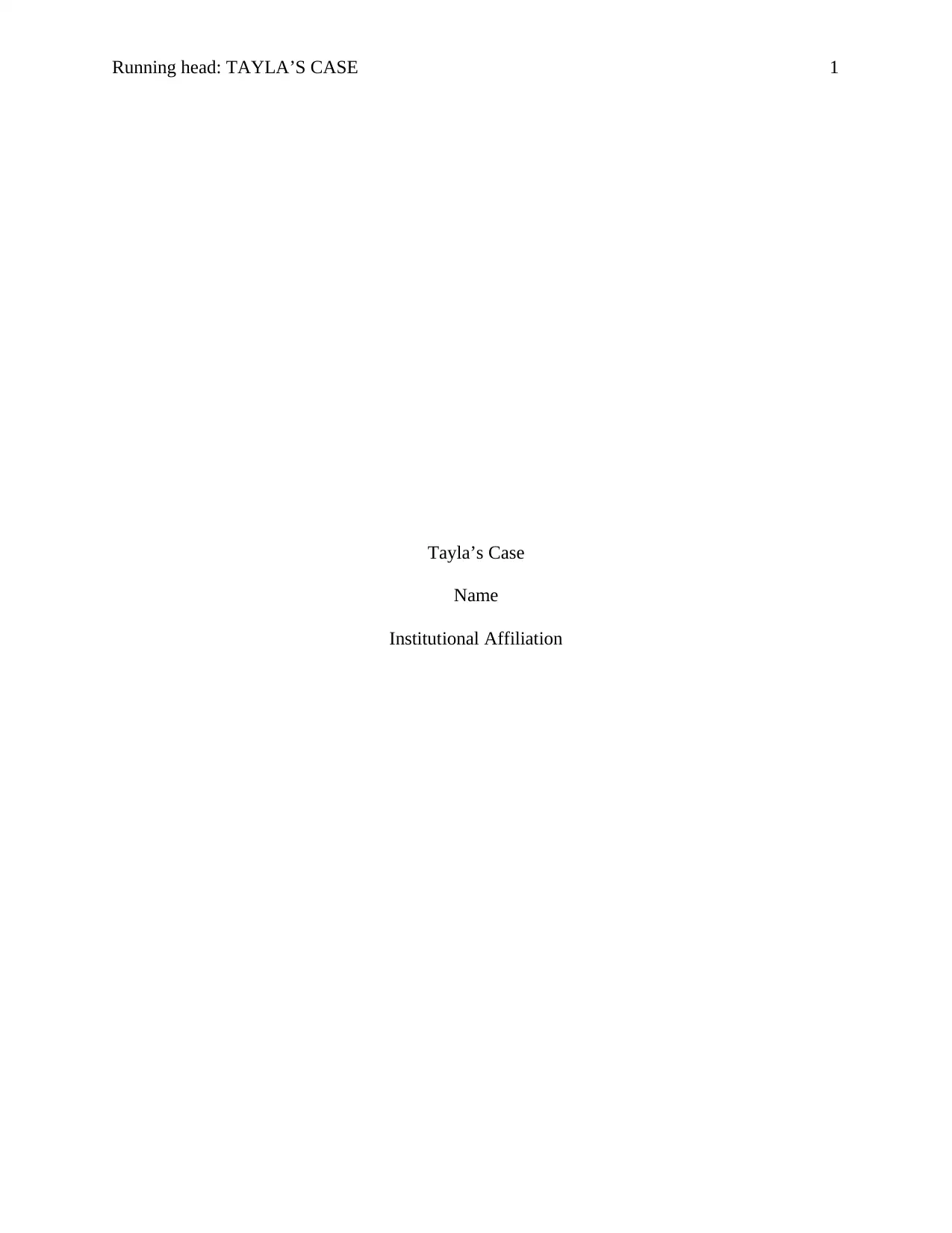
Running head: TAYLA’S CASE 1
Tayla’s Case
Name
Institutional Affiliation
Tayla’s Case
Name
Institutional Affiliation
Paraphrase This Document
Need a fresh take? Get an instant paraphrase of this document with our AI Paraphraser
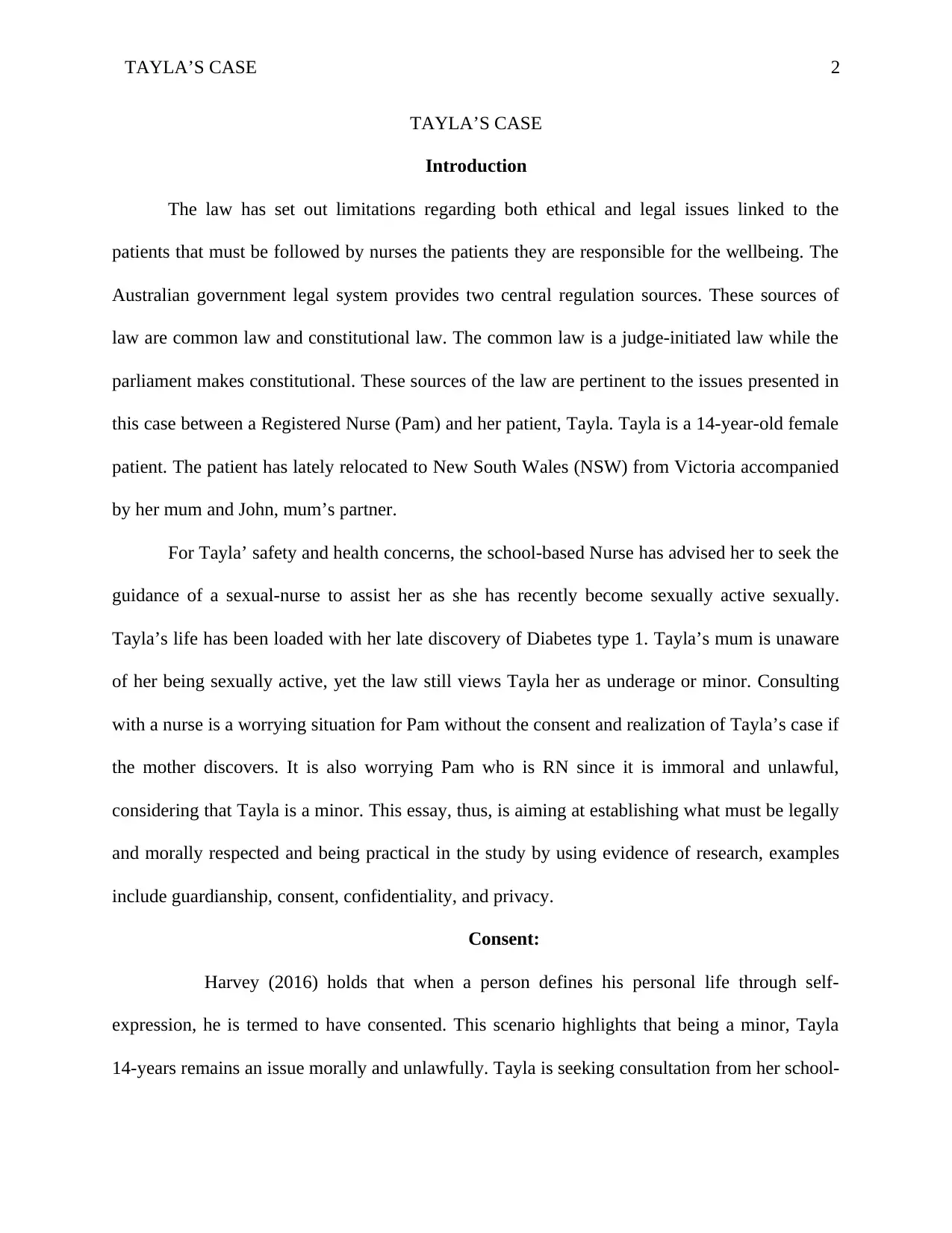
TAYLA’S CASE 2
TAYLA’S CASE
Introduction
The law has set out limitations regarding both ethical and legal issues linked to the
patients that must be followed by nurses the patients they are responsible for the wellbeing. The
Australian government legal system provides two central regulation sources. These sources of
law are common law and constitutional law. The common law is a judge-initiated law while the
parliament makes constitutional. These sources of the law are pertinent to the issues presented in
this case between a Registered Nurse (Pam) and her patient, Tayla. Tayla is a 14-year-old female
patient. The patient has lately relocated to New South Wales (NSW) from Victoria accompanied
by her mum and John, mum’s partner.
For Tayla’ safety and health concerns, the school-based Nurse has advised her to seek the
guidance of a sexual-nurse to assist her as she has recently become sexually active sexually.
Tayla’s life has been loaded with her late discovery of Diabetes type 1. Tayla’s mum is unaware
of her being sexually active, yet the law still views Tayla her as underage or minor. Consulting
with a nurse is a worrying situation for Pam without the consent and realization of Tayla’s case if
the mother discovers. It is also worrying Pam who is RN since it is immoral and unlawful,
considering that Tayla is a minor. This essay, thus, is aiming at establishing what must be legally
and morally respected and being practical in the study by using evidence of research, examples
include guardianship, consent, confidentiality, and privacy.
Consent:
Harvey (2016) holds that when a person defines his personal life through self-
expression, he is termed to have consented. This scenario highlights that being a minor, Tayla
14-years remains an issue morally and unlawfully. Tayla is seeking consultation from her school-
TAYLA’S CASE
Introduction
The law has set out limitations regarding both ethical and legal issues linked to the
patients that must be followed by nurses the patients they are responsible for the wellbeing. The
Australian government legal system provides two central regulation sources. These sources of
law are common law and constitutional law. The common law is a judge-initiated law while the
parliament makes constitutional. These sources of the law are pertinent to the issues presented in
this case between a Registered Nurse (Pam) and her patient, Tayla. Tayla is a 14-year-old female
patient. The patient has lately relocated to New South Wales (NSW) from Victoria accompanied
by her mum and John, mum’s partner.
For Tayla’ safety and health concerns, the school-based Nurse has advised her to seek the
guidance of a sexual-nurse to assist her as she has recently become sexually active sexually.
Tayla’s life has been loaded with her late discovery of Diabetes type 1. Tayla’s mum is unaware
of her being sexually active, yet the law still views Tayla her as underage or minor. Consulting
with a nurse is a worrying situation for Pam without the consent and realization of Tayla’s case if
the mother discovers. It is also worrying Pam who is RN since it is immoral and unlawful,
considering that Tayla is a minor. This essay, thus, is aiming at establishing what must be legally
and morally respected and being practical in the study by using evidence of research, examples
include guardianship, consent, confidentiality, and privacy.
Consent:
Harvey (2016) holds that when a person defines his personal life through self-
expression, he is termed to have consented. This scenario highlights that being a minor, Tayla
14-years remains an issue morally and unlawfully. Tayla is seeking consultation from her school-
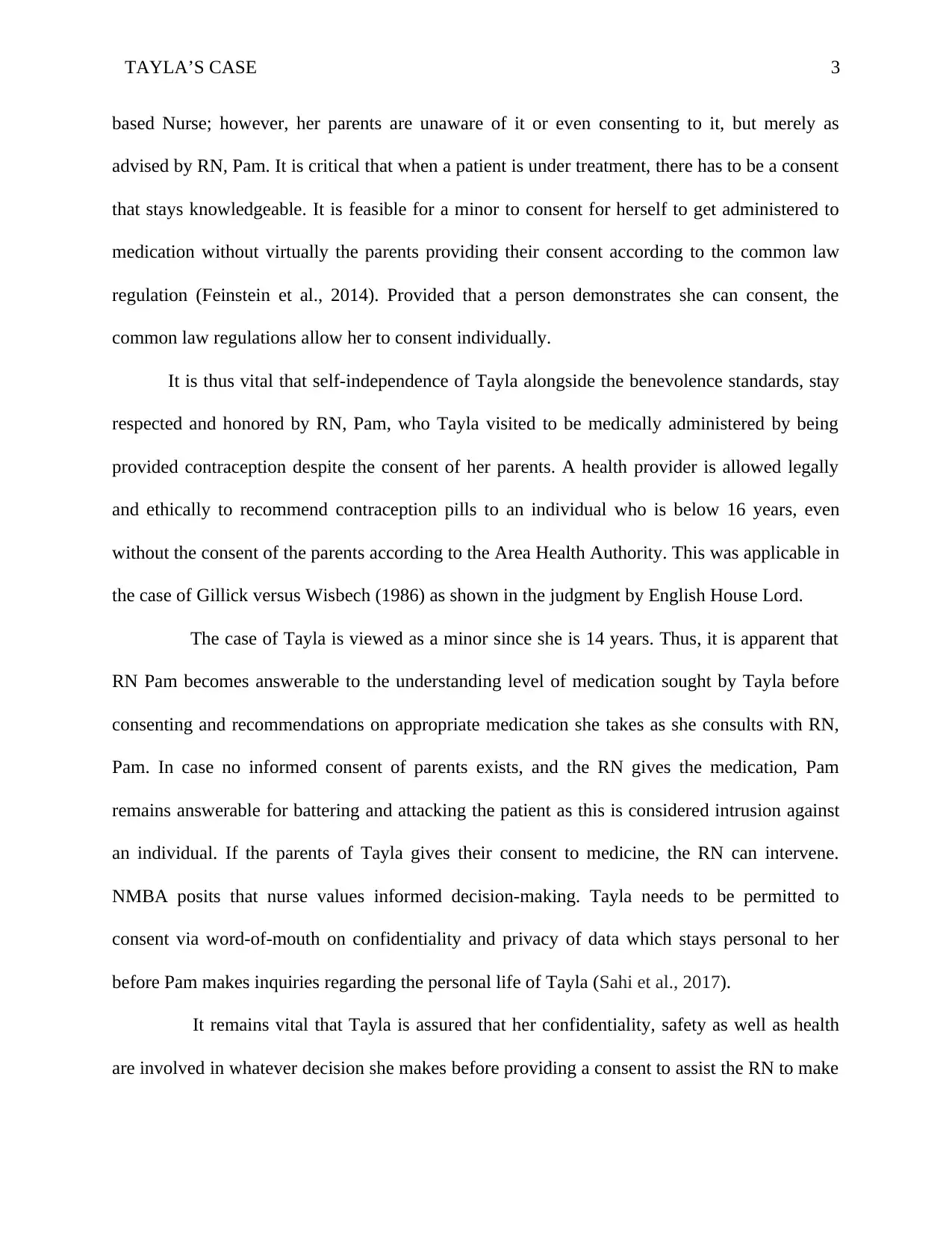
TAYLA’S CASE 3
based Nurse; however, her parents are unaware of it or even consenting to it, but merely as
advised by RN, Pam. It is critical that when a patient is under treatment, there has to be a consent
that stays knowledgeable. It is feasible for a minor to consent for herself to get administered to
medication without virtually the parents providing their consent according to the common law
regulation (Feinstein et al., 2014). Provided that a person demonstrates she can consent, the
common law regulations allow her to consent individually.
It is thus vital that self-independence of Tayla alongside the benevolence standards, stay
respected and honored by RN, Pam, who Tayla visited to be medically administered by being
provided contraception despite the consent of her parents. A health provider is allowed legally
and ethically to recommend contraception pills to an individual who is below 16 years, even
without the consent of the parents according to the Area Health Authority. This was applicable in
the case of Gillick versus Wisbech (1986) as shown in the judgment by English House Lord.
The case of Tayla is viewed as a minor since she is 14 years. Thus, it is apparent that
RN Pam becomes answerable to the understanding level of medication sought by Tayla before
consenting and recommendations on appropriate medication she takes as she consults with RN,
Pam. In case no informed consent of parents exists, and the RN gives the medication, Pam
remains answerable for battering and attacking the patient as this is considered intrusion against
an individual. If the parents of Tayla gives their consent to medicine, the RN can intervene.
NMBA posits that nurse values informed decision-making. Tayla needs to be permitted to
consent via word-of-mouth on confidentiality and privacy of data which stays personal to her
before Pam makes inquiries regarding the personal life of Tayla (Sahi et al., 2017).
It remains vital that Tayla is assured that her confidentiality, safety as well as health
are involved in whatever decision she makes before providing a consent to assist the RN to make
based Nurse; however, her parents are unaware of it or even consenting to it, but merely as
advised by RN, Pam. It is critical that when a patient is under treatment, there has to be a consent
that stays knowledgeable. It is feasible for a minor to consent for herself to get administered to
medication without virtually the parents providing their consent according to the common law
regulation (Feinstein et al., 2014). Provided that a person demonstrates she can consent, the
common law regulations allow her to consent individually.
It is thus vital that self-independence of Tayla alongside the benevolence standards, stay
respected and honored by RN, Pam, who Tayla visited to be medically administered by being
provided contraception despite the consent of her parents. A health provider is allowed legally
and ethically to recommend contraception pills to an individual who is below 16 years, even
without the consent of the parents according to the Area Health Authority. This was applicable in
the case of Gillick versus Wisbech (1986) as shown in the judgment by English House Lord.
The case of Tayla is viewed as a minor since she is 14 years. Thus, it is apparent that
RN Pam becomes answerable to the understanding level of medication sought by Tayla before
consenting and recommendations on appropriate medication she takes as she consults with RN,
Pam. In case no informed consent of parents exists, and the RN gives the medication, Pam
remains answerable for battering and attacking the patient as this is considered intrusion against
an individual. If the parents of Tayla gives their consent to medicine, the RN can intervene.
NMBA posits that nurse values informed decision-making. Tayla needs to be permitted to
consent via word-of-mouth on confidentiality and privacy of data which stays personal to her
before Pam makes inquiries regarding the personal life of Tayla (Sahi et al., 2017).
It remains vital that Tayla is assured that her confidentiality, safety as well as health
are involved in whatever decision she makes before providing a consent to assist the RN to make
⊘ This is a preview!⊘
Do you want full access?
Subscribe today to unlock all pages.

Trusted by 1+ million students worldwide
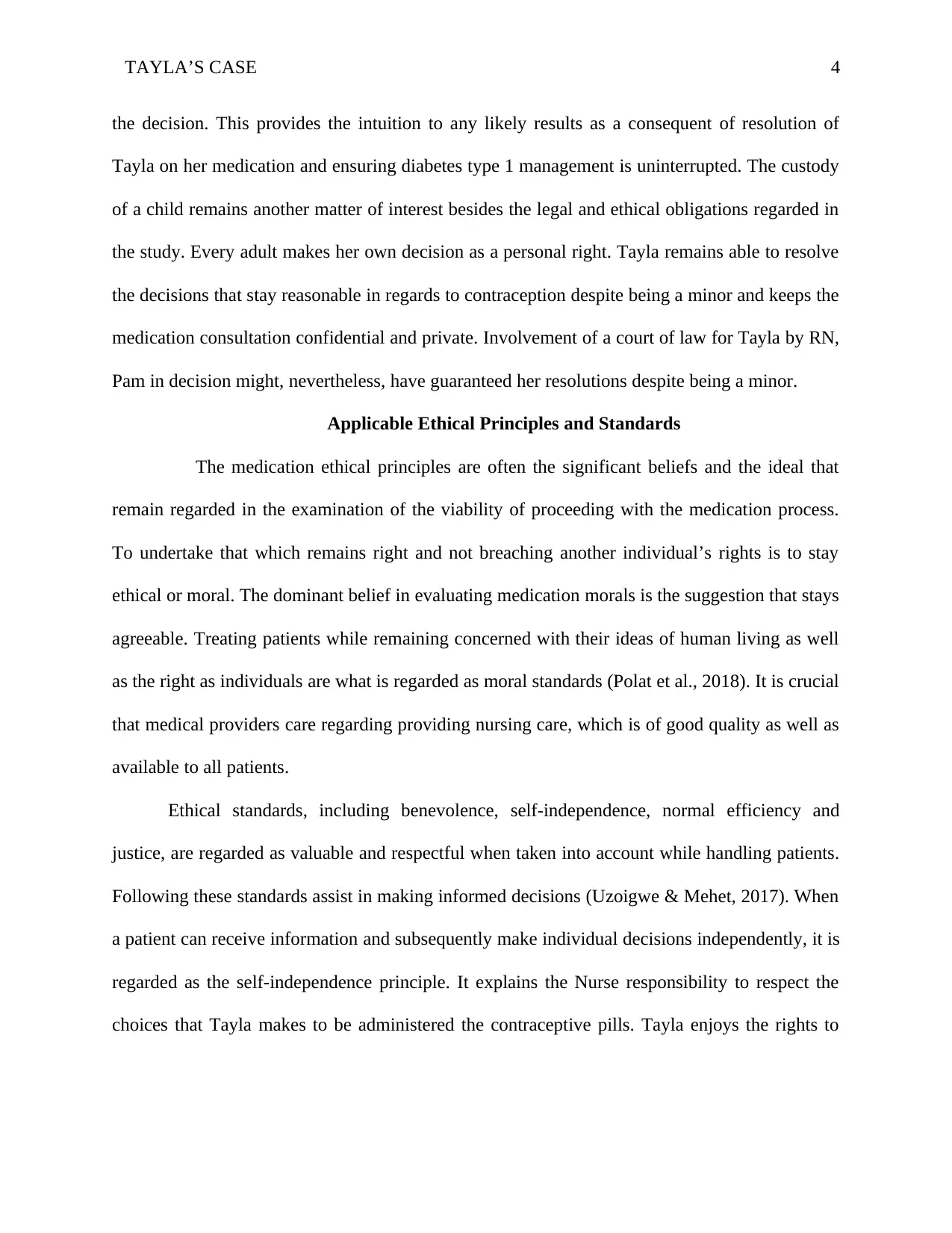
TAYLA’S CASE 4
the decision. This provides the intuition to any likely results as a consequent of resolution of
Tayla on her medication and ensuring diabetes type 1 management is uninterrupted. The custody
of a child remains another matter of interest besides the legal and ethical obligations regarded in
the study. Every adult makes her own decision as a personal right. Tayla remains able to resolve
the decisions that stay reasonable in regards to contraception despite being a minor and keeps the
medication consultation confidential and private. Involvement of a court of law for Tayla by RN,
Pam in decision might, nevertheless, have guaranteed her resolutions despite being a minor.
Applicable Ethical Principles and Standards
The medication ethical principles are often the significant beliefs and the ideal that
remain regarded in the examination of the viability of proceeding with the medication process.
To undertake that which remains right and not breaching another individual’s rights is to stay
ethical or moral. The dominant belief in evaluating medication morals is the suggestion that stays
agreeable. Treating patients while remaining concerned with their ideas of human living as well
as the right as individuals are what is regarded as moral standards (Polat et al., 2018). It is crucial
that medical providers care regarding providing nursing care, which is of good quality as well as
available to all patients.
Ethical standards, including benevolence, self-independence, normal efficiency and
justice, are regarded as valuable and respectful when taken into account while handling patients.
Following these standards assist in making informed decisions (Uzoigwe & Mehet, 2017). When
a patient can receive information and subsequently make individual decisions independently, it is
regarded as the self-independence principle. It explains the Nurse responsibility to respect the
choices that Tayla makes to be administered the contraceptive pills. Tayla enjoys the rights to
the decision. This provides the intuition to any likely results as a consequent of resolution of
Tayla on her medication and ensuring diabetes type 1 management is uninterrupted. The custody
of a child remains another matter of interest besides the legal and ethical obligations regarded in
the study. Every adult makes her own decision as a personal right. Tayla remains able to resolve
the decisions that stay reasonable in regards to contraception despite being a minor and keeps the
medication consultation confidential and private. Involvement of a court of law for Tayla by RN,
Pam in decision might, nevertheless, have guaranteed her resolutions despite being a minor.
Applicable Ethical Principles and Standards
The medication ethical principles are often the significant beliefs and the ideal that
remain regarded in the examination of the viability of proceeding with the medication process.
To undertake that which remains right and not breaching another individual’s rights is to stay
ethical or moral. The dominant belief in evaluating medication morals is the suggestion that stays
agreeable. Treating patients while remaining concerned with their ideas of human living as well
as the right as individuals are what is regarded as moral standards (Polat et al., 2018). It is crucial
that medical providers care regarding providing nursing care, which is of good quality as well as
available to all patients.
Ethical standards, including benevolence, self-independence, normal efficiency and
justice, are regarded as valuable and respectful when taken into account while handling patients.
Following these standards assist in making informed decisions (Uzoigwe & Mehet, 2017). When
a patient can receive information and subsequently make individual decisions independently, it is
regarded as the self-independence principle. It explains the Nurse responsibility to respect the
choices that Tayla makes to be administered the contraceptive pills. Tayla enjoys the rights to
Paraphrase This Document
Need a fresh take? Get an instant paraphrase of this document with our AI Paraphraser
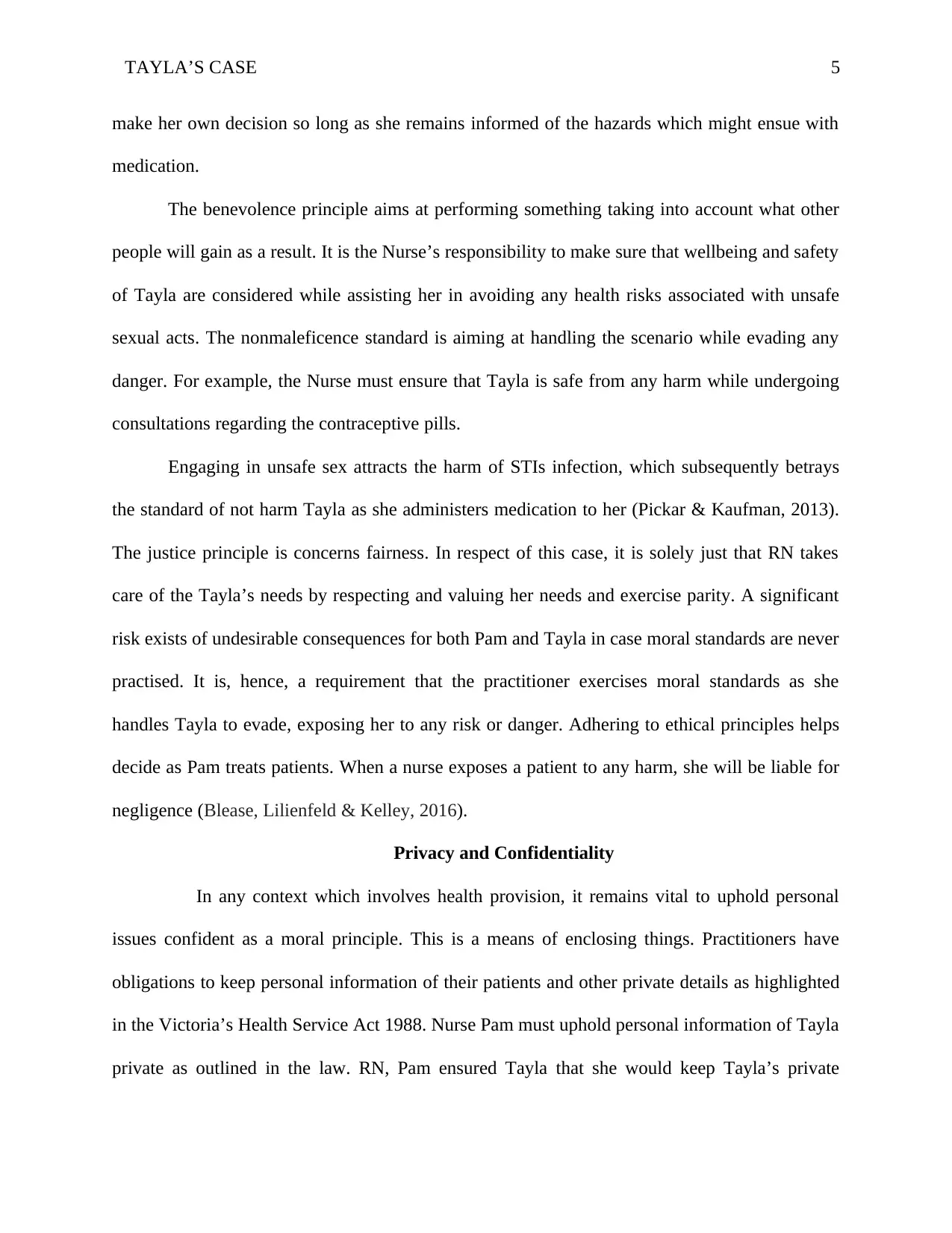
TAYLA’S CASE 5
make her own decision so long as she remains informed of the hazards which might ensue with
medication.
The benevolence principle aims at performing something taking into account what other
people will gain as a result. It is the Nurse’s responsibility to make sure that wellbeing and safety
of Tayla are considered while assisting her in avoiding any health risks associated with unsafe
sexual acts. The nonmaleficence standard is aiming at handling the scenario while evading any
danger. For example, the Nurse must ensure that Tayla is safe from any harm while undergoing
consultations regarding the contraceptive pills.
Engaging in unsafe sex attracts the harm of STIs infection, which subsequently betrays
the standard of not harm Tayla as she administers medication to her (Pickar & Kaufman, 2013).
The justice principle is concerns fairness. In respect of this case, it is solely just that RN takes
care of the Tayla’s needs by respecting and valuing her needs and exercise parity. A significant
risk exists of undesirable consequences for both Pam and Tayla in case moral standards are never
practised. It is, hence, a requirement that the practitioner exercises moral standards as she
handles Tayla to evade, exposing her to any risk or danger. Adhering to ethical principles helps
decide as Pam treats patients. When a nurse exposes a patient to any harm, she will be liable for
negligence (Blease, Lilienfeld & Kelley, 2016).
Privacy and Confidentiality
In any context which involves health provision, it remains vital to uphold personal
issues confident as a moral principle. This is a means of enclosing things. Practitioners have
obligations to keep personal information of their patients and other private details as highlighted
in the Victoria’s Health Service Act 1988. Nurse Pam must uphold personal information of Tayla
private as outlined in the law. RN, Pam ensured Tayla that she would keep Tayla’s private
make her own decision so long as she remains informed of the hazards which might ensue with
medication.
The benevolence principle aims at performing something taking into account what other
people will gain as a result. It is the Nurse’s responsibility to make sure that wellbeing and safety
of Tayla are considered while assisting her in avoiding any health risks associated with unsafe
sexual acts. The nonmaleficence standard is aiming at handling the scenario while evading any
danger. For example, the Nurse must ensure that Tayla is safe from any harm while undergoing
consultations regarding the contraceptive pills.
Engaging in unsafe sex attracts the harm of STIs infection, which subsequently betrays
the standard of not harm Tayla as she administers medication to her (Pickar & Kaufman, 2013).
The justice principle is concerns fairness. In respect of this case, it is solely just that RN takes
care of the Tayla’s needs by respecting and valuing her needs and exercise parity. A significant
risk exists of undesirable consequences for both Pam and Tayla in case moral standards are never
practised. It is, hence, a requirement that the practitioner exercises moral standards as she
handles Tayla to evade, exposing her to any risk or danger. Adhering to ethical principles helps
decide as Pam treats patients. When a nurse exposes a patient to any harm, she will be liable for
negligence (Blease, Lilienfeld & Kelley, 2016).
Privacy and Confidentiality
In any context which involves health provision, it remains vital to uphold personal
issues confident as a moral principle. This is a means of enclosing things. Practitioners have
obligations to keep personal information of their patients and other private details as highlighted
in the Victoria’s Health Service Act 1988. Nurse Pam must uphold personal information of Tayla
private as outlined in the law. RN, Pam ensured Tayla that she would keep Tayla’s private
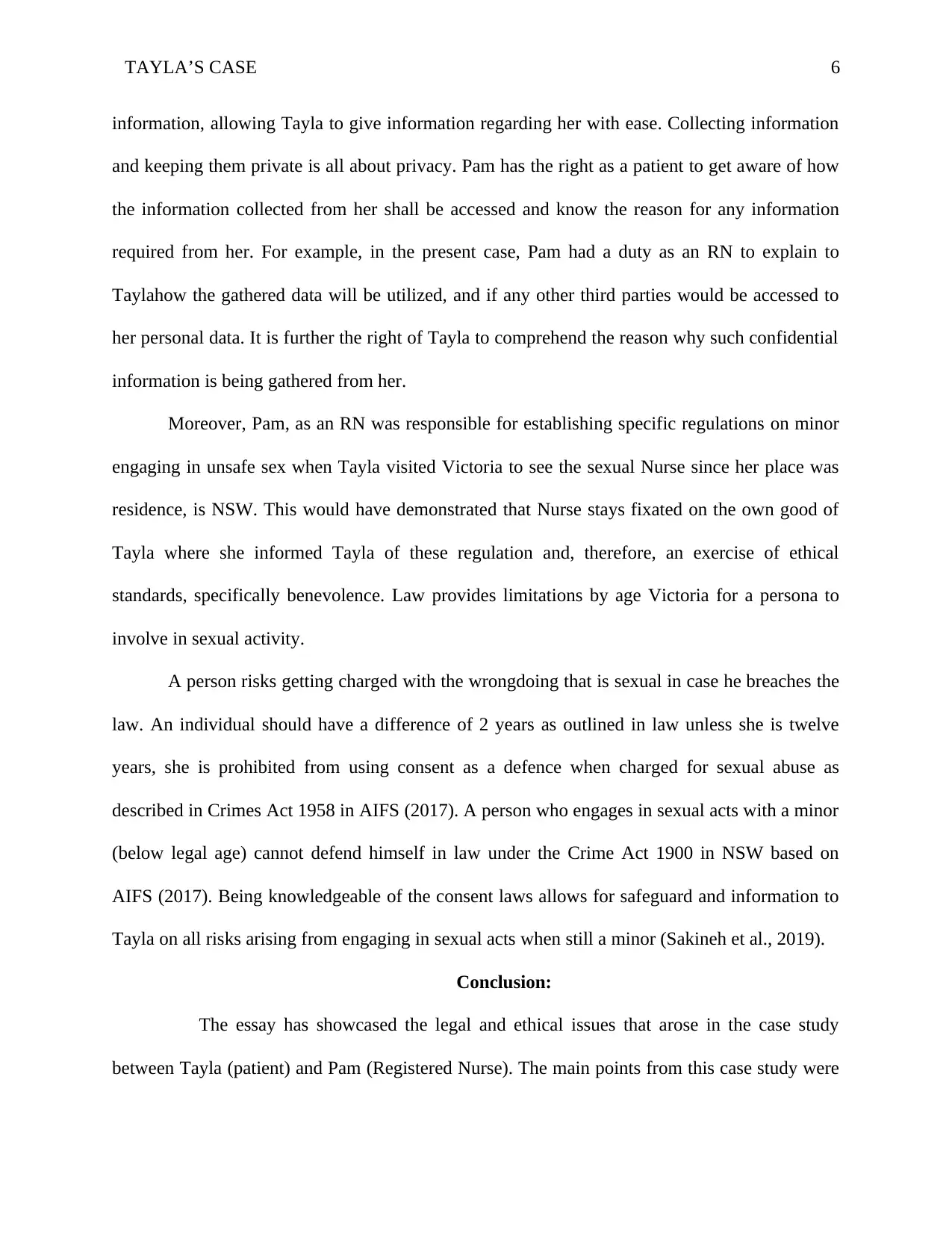
TAYLA’S CASE 6
information, allowing Tayla to give information regarding her with ease. Collecting information
and keeping them private is all about privacy. Pam has the right as a patient to get aware of how
the information collected from her shall be accessed and know the reason for any information
required from her. For example, in the present case, Pam had a duty as an RN to explain to
Taylahow the gathered data will be utilized, and if any other third parties would be accessed to
her personal data. It is further the right of Tayla to comprehend the reason why such confidential
information is being gathered from her.
Moreover, Pam, as an RN was responsible for establishing specific regulations on minor
engaging in unsafe sex when Tayla visited Victoria to see the sexual Nurse since her place was
residence, is NSW. This would have demonstrated that Nurse stays fixated on the own good of
Tayla where she informed Tayla of these regulation and, therefore, an exercise of ethical
standards, specifically benevolence. Law provides limitations by age Victoria for a persona to
involve in sexual activity.
A person risks getting charged with the wrongdoing that is sexual in case he breaches the
law. An individual should have a difference of 2 years as outlined in law unless she is twelve
years, she is prohibited from using consent as a defence when charged for sexual abuse as
described in Crimes Act 1958 in AIFS (2017). A person who engages in sexual acts with a minor
(below legal age) cannot defend himself in law under the Crime Act 1900 in NSW based on
AIFS (2017). Being knowledgeable of the consent laws allows for safeguard and information to
Tayla on all risks arising from engaging in sexual acts when still a minor (Sakineh et al., 2019).
Conclusion:
The essay has showcased the legal and ethical issues that arose in the case study
between Tayla (patient) and Pam (Registered Nurse). The main points from this case study were
information, allowing Tayla to give information regarding her with ease. Collecting information
and keeping them private is all about privacy. Pam has the right as a patient to get aware of how
the information collected from her shall be accessed and know the reason for any information
required from her. For example, in the present case, Pam had a duty as an RN to explain to
Taylahow the gathered data will be utilized, and if any other third parties would be accessed to
her personal data. It is further the right of Tayla to comprehend the reason why such confidential
information is being gathered from her.
Moreover, Pam, as an RN was responsible for establishing specific regulations on minor
engaging in unsafe sex when Tayla visited Victoria to see the sexual Nurse since her place was
residence, is NSW. This would have demonstrated that Nurse stays fixated on the own good of
Tayla where she informed Tayla of these regulation and, therefore, an exercise of ethical
standards, specifically benevolence. Law provides limitations by age Victoria for a persona to
involve in sexual activity.
A person risks getting charged with the wrongdoing that is sexual in case he breaches the
law. An individual should have a difference of 2 years as outlined in law unless she is twelve
years, she is prohibited from using consent as a defence when charged for sexual abuse as
described in Crimes Act 1958 in AIFS (2017). A person who engages in sexual acts with a minor
(below legal age) cannot defend himself in law under the Crime Act 1900 in NSW based on
AIFS (2017). Being knowledgeable of the consent laws allows for safeguard and information to
Tayla on all risks arising from engaging in sexual acts when still a minor (Sakineh et al., 2019).
Conclusion:
The essay has showcased the legal and ethical issues that arose in the case study
between Tayla (patient) and Pam (Registered Nurse). The main points from this case study were
⊘ This is a preview!⊘
Do you want full access?
Subscribe today to unlock all pages.

Trusted by 1+ million students worldwide
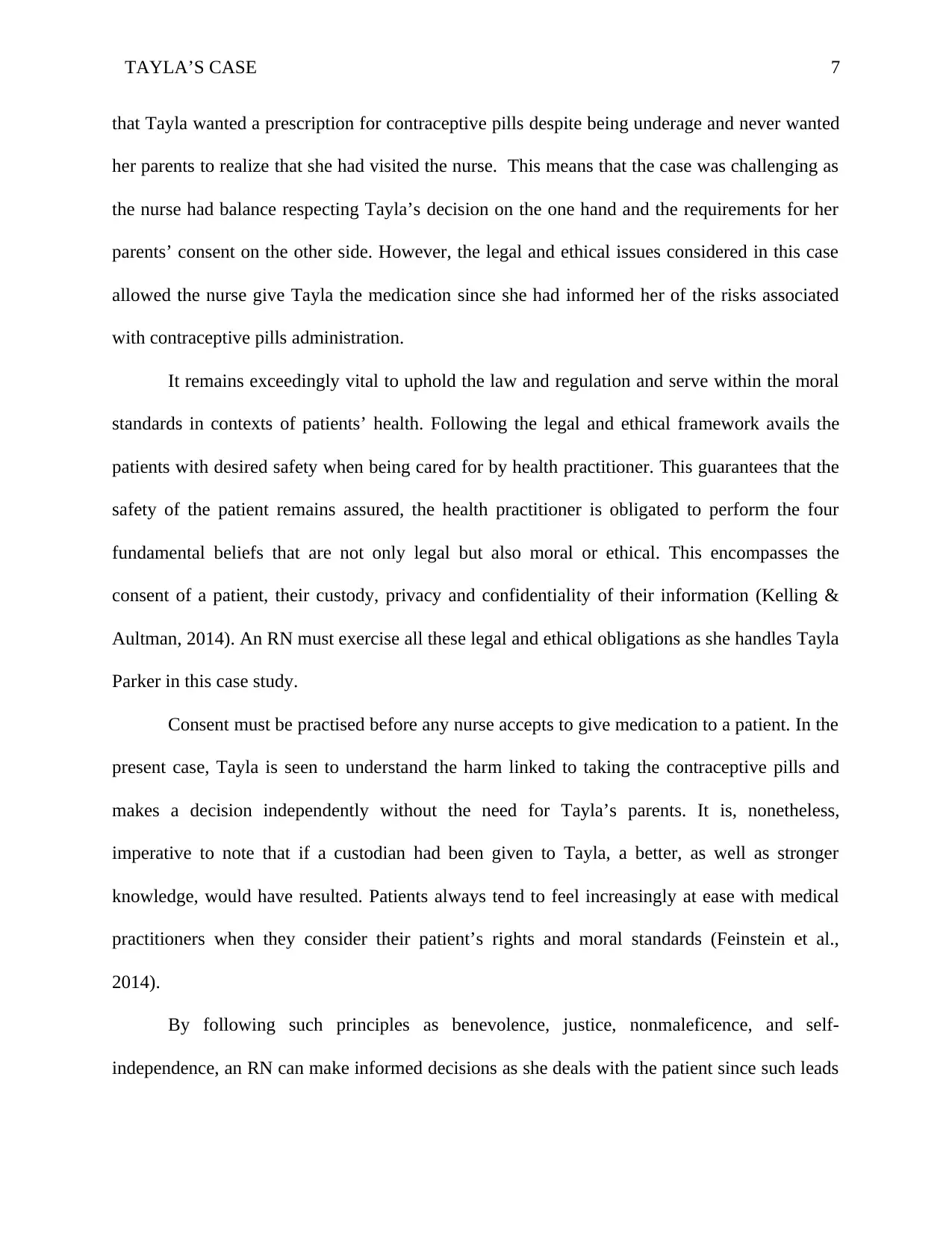
TAYLA’S CASE 7
that Tayla wanted a prescription for contraceptive pills despite being underage and never wanted
her parents to realize that she had visited the nurse. This means that the case was challenging as
the nurse had balance respecting Tayla’s decision on the one hand and the requirements for her
parents’ consent on the other side. However, the legal and ethical issues considered in this case
allowed the nurse give Tayla the medication since she had informed her of the risks associated
with contraceptive pills administration.
It remains exceedingly vital to uphold the law and regulation and serve within the moral
standards in contexts of patients’ health. Following the legal and ethical framework avails the
patients with desired safety when being cared for by health practitioner. This guarantees that the
safety of the patient remains assured, the health practitioner is obligated to perform the four
fundamental beliefs that are not only legal but also moral or ethical. This encompasses the
consent of a patient, their custody, privacy and confidentiality of their information (Kelling &
Aultman, 2014). An RN must exercise all these legal and ethical obligations as she handles Tayla
Parker in this case study.
Consent must be practised before any nurse accepts to give medication to a patient. In the
present case, Tayla is seen to understand the harm linked to taking the contraceptive pills and
makes a decision independently without the need for Tayla’s parents. It is, nonetheless,
imperative to note that if a custodian had been given to Tayla, a better, as well as stronger
knowledge, would have resulted. Patients always tend to feel increasingly at ease with medical
practitioners when they consider their patient’s rights and moral standards (Feinstein et al.,
2014).
By following such principles as benevolence, justice, nonmaleficence, and self-
independence, an RN can make informed decisions as she deals with the patient since such leads
that Tayla wanted a prescription for contraceptive pills despite being underage and never wanted
her parents to realize that she had visited the nurse. This means that the case was challenging as
the nurse had balance respecting Tayla’s decision on the one hand and the requirements for her
parents’ consent on the other side. However, the legal and ethical issues considered in this case
allowed the nurse give Tayla the medication since she had informed her of the risks associated
with contraceptive pills administration.
It remains exceedingly vital to uphold the law and regulation and serve within the moral
standards in contexts of patients’ health. Following the legal and ethical framework avails the
patients with desired safety when being cared for by health practitioner. This guarantees that the
safety of the patient remains assured, the health practitioner is obligated to perform the four
fundamental beliefs that are not only legal but also moral or ethical. This encompasses the
consent of a patient, their custody, privacy and confidentiality of their information (Kelling &
Aultman, 2014). An RN must exercise all these legal and ethical obligations as she handles Tayla
Parker in this case study.
Consent must be practised before any nurse accepts to give medication to a patient. In the
present case, Tayla is seen to understand the harm linked to taking the contraceptive pills and
makes a decision independently without the need for Tayla’s parents. It is, nonetheless,
imperative to note that if a custodian had been given to Tayla, a better, as well as stronger
knowledge, would have resulted. Patients always tend to feel increasingly at ease with medical
practitioners when they consider their patient’s rights and moral standards (Feinstein et al.,
2014).
By following such principles as benevolence, justice, nonmaleficence, and self-
independence, an RN can make informed decisions as she deals with the patient since such leads
Paraphrase This Document
Need a fresh take? Get an instant paraphrase of this document with our AI Paraphraser
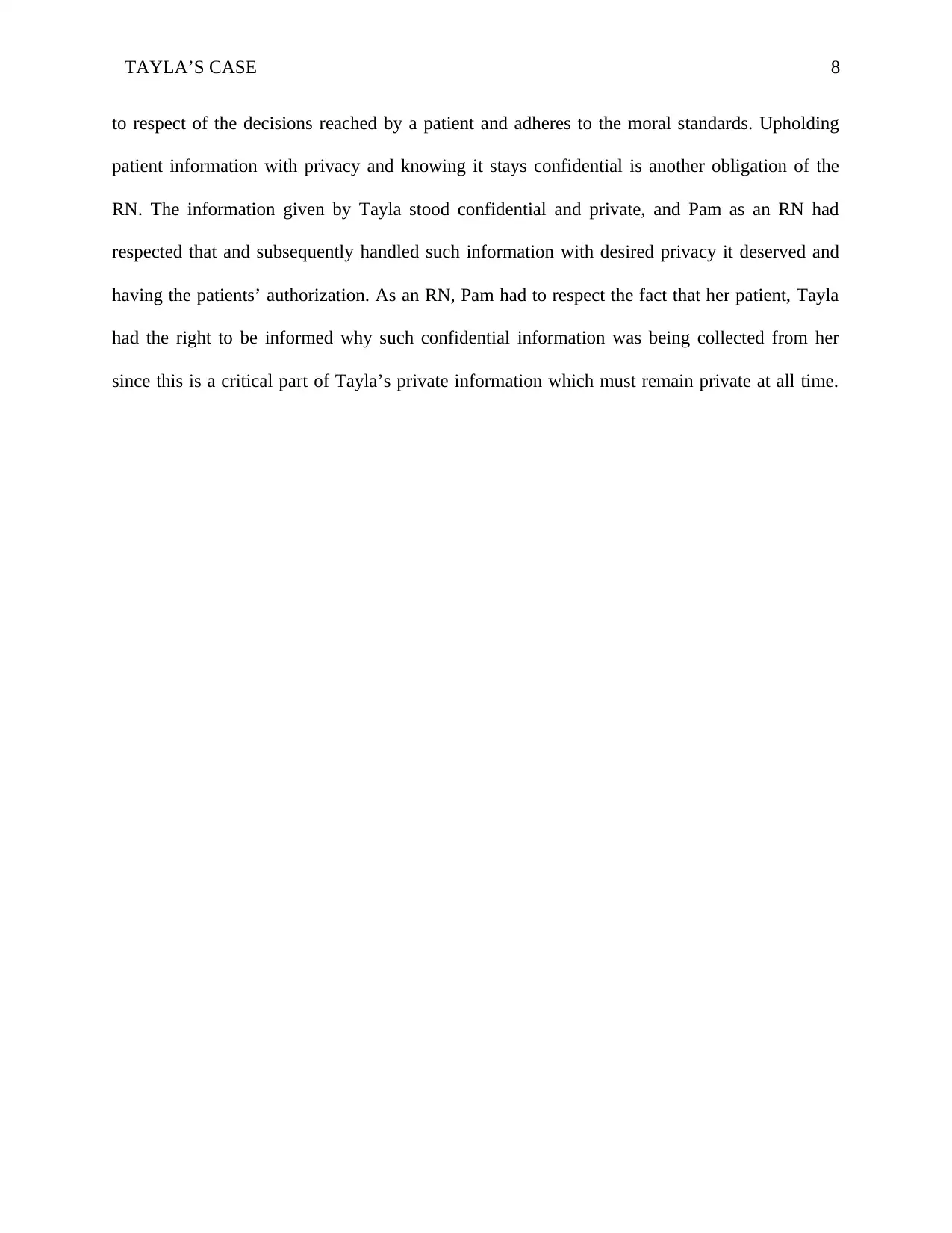
TAYLA’S CASE 8
to respect of the decisions reached by a patient and adheres to the moral standards. Upholding
patient information with privacy and knowing it stays confidential is another obligation of the
RN. The information given by Tayla stood confidential and private, and Pam as an RN had
respected that and subsequently handled such information with desired privacy it deserved and
having the patients’ authorization. As an RN, Pam had to respect the fact that her patient, Tayla
had the right to be informed why such confidential information was being collected from her
since this is a critical part of Tayla’s private information which must remain private at all time.
to respect of the decisions reached by a patient and adheres to the moral standards. Upholding
patient information with privacy and knowing it stays confidential is another obligation of the
RN. The information given by Tayla stood confidential and private, and Pam as an RN had
respected that and subsequently handled such information with desired privacy it deserved and
having the patients’ authorization. As an RN, Pam had to respect the fact that her patient, Tayla
had the right to be informed why such confidential information was being collected from her
since this is a critical part of Tayla’s private information which must remain private at all time.
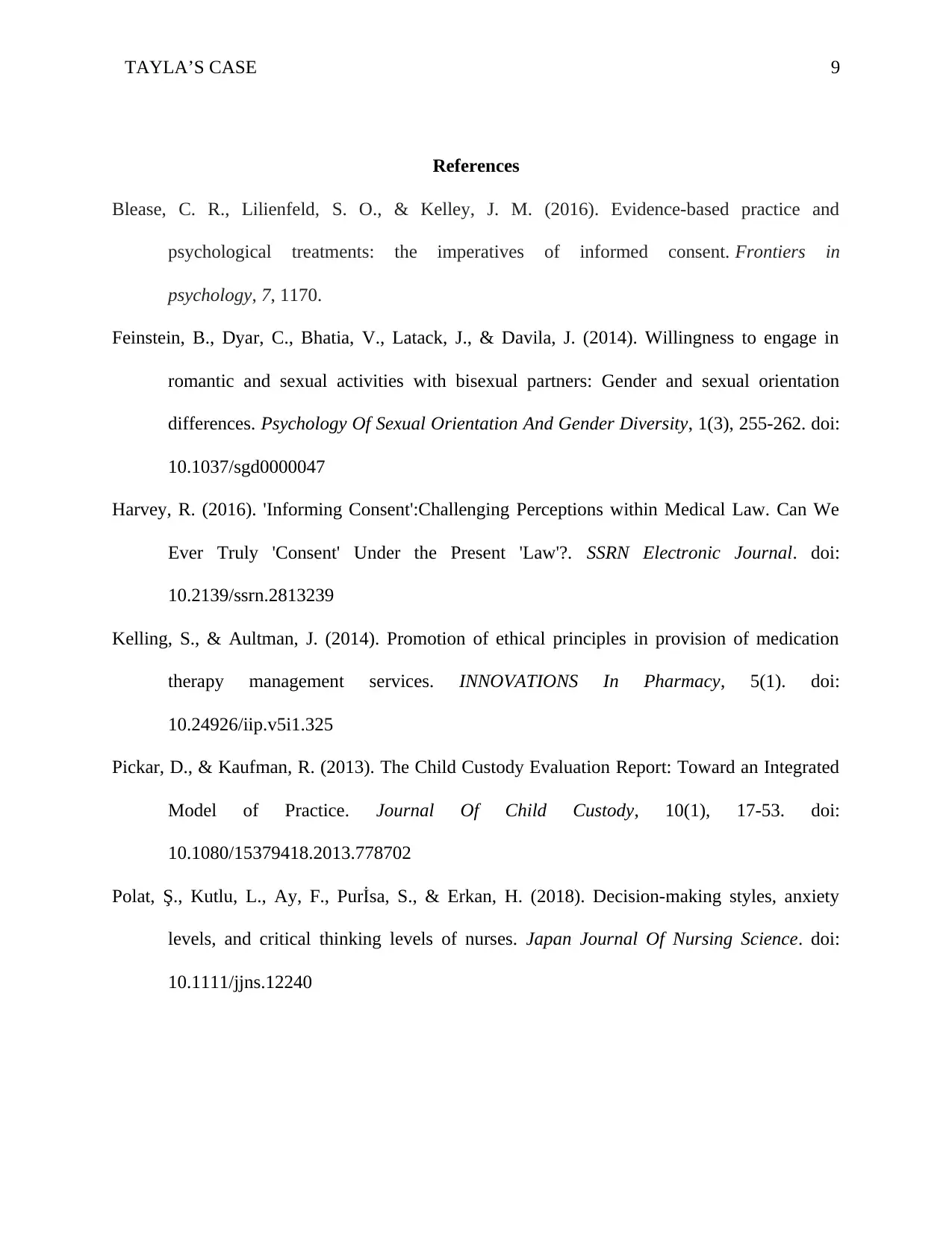
TAYLA’S CASE 9
References
Blease, C. R., Lilienfeld, S. O., & Kelley, J. M. (2016). Evidence-based practice and
psychological treatments: the imperatives of informed consent. Frontiers in
psychology, 7, 1170.
Feinstein, B., Dyar, C., Bhatia, V., Latack, J., & Davila, J. (2014). Willingness to engage in
romantic and sexual activities with bisexual partners: Gender and sexual orientation
differences. Psychology Of Sexual Orientation And Gender Diversity, 1(3), 255-262. doi:
10.1037/sgd0000047
Harvey, R. (2016). 'Informing Consent':Challenging Perceptions within Medical Law. Can We
Ever Truly 'Consent' Under the Present 'Law'?. SSRN Electronic Journal. doi:
10.2139/ssrn.2813239
Kelling, S., & Aultman, J. (2014). Promotion of ethical principles in provision of medication
therapy management services. INNOVATIONS In Pharmacy, 5(1). doi:
10.24926/iip.v5i1.325
Pickar, D., & Kaufman, R. (2013). The Child Custody Evaluation Report: Toward an Integrated
Model of Practice. Journal Of Child Custody, 10(1), 17-53. doi:
10.1080/15379418.2013.778702
Polat, Ş., Kutlu, L., Ay, F., Purİsa, S., & Erkan, H. (2018). Decision-making styles, anxiety
levels, and critical thinking levels of nurses. Japan Journal Of Nursing Science. doi:
10.1111/jjns.12240
References
Blease, C. R., Lilienfeld, S. O., & Kelley, J. M. (2016). Evidence-based practice and
psychological treatments: the imperatives of informed consent. Frontiers in
psychology, 7, 1170.
Feinstein, B., Dyar, C., Bhatia, V., Latack, J., & Davila, J. (2014). Willingness to engage in
romantic and sexual activities with bisexual partners: Gender and sexual orientation
differences. Psychology Of Sexual Orientation And Gender Diversity, 1(3), 255-262. doi:
10.1037/sgd0000047
Harvey, R. (2016). 'Informing Consent':Challenging Perceptions within Medical Law. Can We
Ever Truly 'Consent' Under the Present 'Law'?. SSRN Electronic Journal. doi:
10.2139/ssrn.2813239
Kelling, S., & Aultman, J. (2014). Promotion of ethical principles in provision of medication
therapy management services. INNOVATIONS In Pharmacy, 5(1). doi:
10.24926/iip.v5i1.325
Pickar, D., & Kaufman, R. (2013). The Child Custody Evaluation Report: Toward an Integrated
Model of Practice. Journal Of Child Custody, 10(1), 17-53. doi:
10.1080/15379418.2013.778702
Polat, Ş., Kutlu, L., Ay, F., Purİsa, S., & Erkan, H. (2018). Decision-making styles, anxiety
levels, and critical thinking levels of nurses. Japan Journal Of Nursing Science. doi:
10.1111/jjns.12240
⊘ This is a preview!⊘
Do you want full access?
Subscribe today to unlock all pages.

Trusted by 1+ million students worldwide
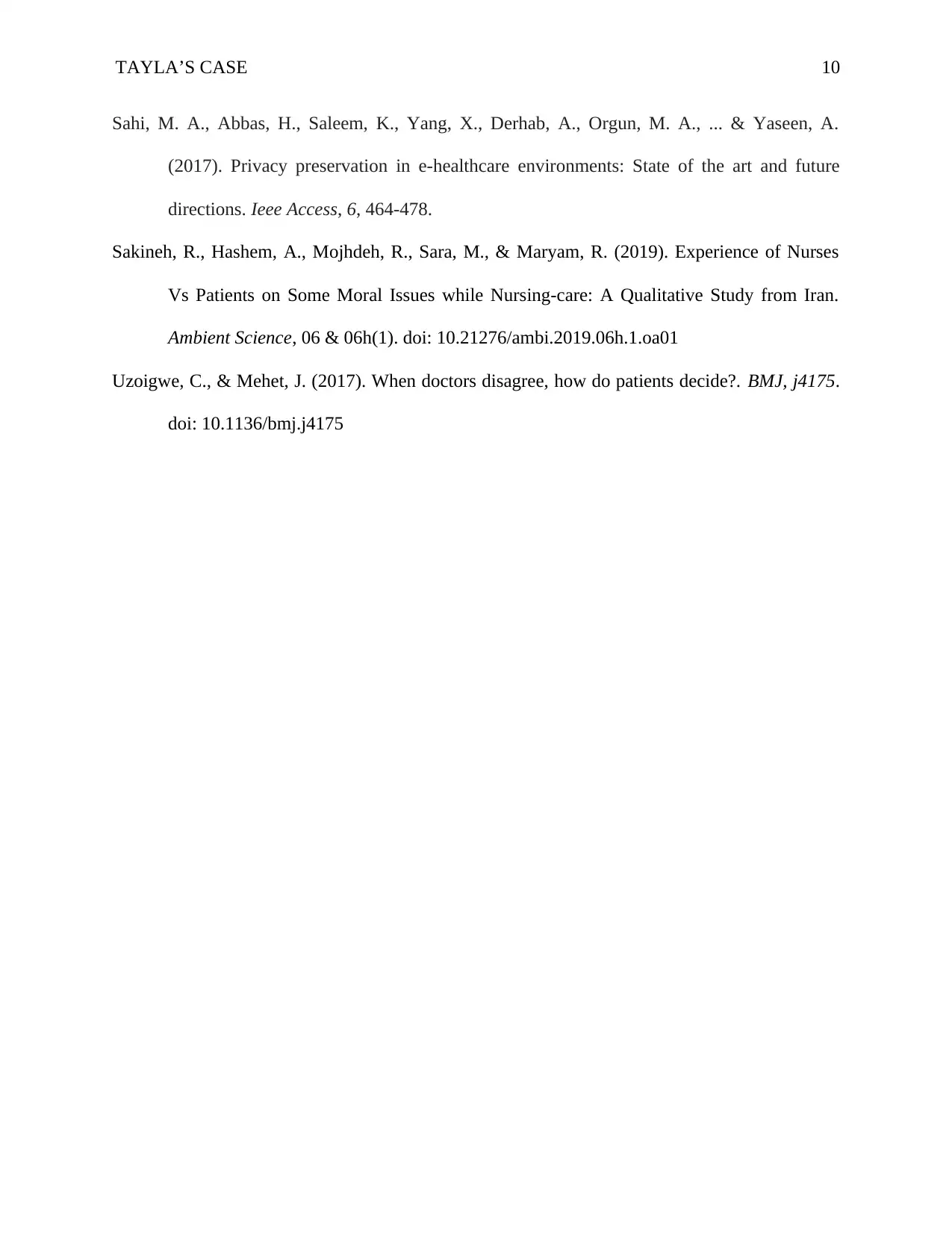
TAYLA’S CASE 10
Sahi, M. A., Abbas, H., Saleem, K., Yang, X., Derhab, A., Orgun, M. A., ... & Yaseen, A.
(2017). Privacy preservation in e-healthcare environments: State of the art and future
directions. Ieee Access, 6, 464-478.
Sakineh, R., Hashem, A., Mojhdeh, R., Sara, M., & Maryam, R. (2019). Experience of Nurses
Vs Patients on Some Moral Issues while Nursing-care: A Qualitative Study from Iran.
Ambient Science, 06 & 06h(1). doi: 10.21276/ambi.2019.06h.1.oa01
Uzoigwe, C., & Mehet, J. (2017). When doctors disagree, how do patients decide?. BMJ, j4175.
doi: 10.1136/bmj.j4175
Sahi, M. A., Abbas, H., Saleem, K., Yang, X., Derhab, A., Orgun, M. A., ... & Yaseen, A.
(2017). Privacy preservation in e-healthcare environments: State of the art and future
directions. Ieee Access, 6, 464-478.
Sakineh, R., Hashem, A., Mojhdeh, R., Sara, M., & Maryam, R. (2019). Experience of Nurses
Vs Patients on Some Moral Issues while Nursing-care: A Qualitative Study from Iran.
Ambient Science, 06 & 06h(1). doi: 10.21276/ambi.2019.06h.1.oa01
Uzoigwe, C., & Mehet, J. (2017). When doctors disagree, how do patients decide?. BMJ, j4175.
doi: 10.1136/bmj.j4175
1 out of 10
Related Documents
Your All-in-One AI-Powered Toolkit for Academic Success.
+13062052269
info@desklib.com
Available 24*7 on WhatsApp / Email
![[object Object]](/_next/static/media/star-bottom.7253800d.svg)
Unlock your academic potential
Copyright © 2020–2026 A2Z Services. All Rights Reserved. Developed and managed by ZUCOL.





